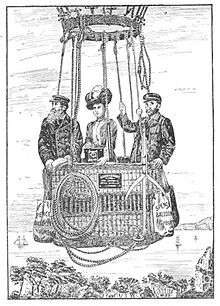Gertrude Bacon
Gertrude Bacon (19 April 1874 – 22 December 1949) was an aeronautical pioneer. She achieved a considerable number of "firsts" for women in aeronautics, as well as making contributions in the areas of astronomy and botany. Gertrude popularized aeronautics through her writing, and promoted both commercial and popular flying as fields for women.
Gertrude Bacon | |
|---|---|
 John Bacon, Gertrude Bacon, and Stanley Spencer | |
| Born | 19 April 1874 Cambridge, England |
| Died | 22 December 1949 (aged 75) |
| Nationality | English |
| Occupation | author, aeronautical pioneer, astronomer, botanist |
Notable work | Memories of Land and Sky, Ballons, airships and flying machines, The record of an aeronaut, being the life of John M. Bacon |
| Spouse(s) | Thomas Jackson Foggitt |
| Relatives | John Mackenzie Bacon |
Early life
Gertrude was born at Cambridge, to John Mackenzie Bacon (19 June 1846 – 26 December 1904) and his first wife, Gertrude Myers. The family moved in 1876 to Cold Ash, Berkshire, near Newbury. Gertrude's father, John Mackenzie Bacon was an astronomer, aeronaut, and scientist, who educated his children at home.[1] Gertrude also was briefly educated at The Maynard School, in Exeter. [2].
Gertrude became her father's scientific collaborator in both astronomy and aeronautics. She was an original member of the British Astronomical Association, and a member of the British Association for the Advancement of Science.[3]
Astronomy
She accompanied her father on expeditions to film total solar eclipses in Vadso, Lapland (1896), Buxar, India (Dec 1897-1898), and Wadesborough, North Carolina (May 1900).[3] When their first expedition was unsuccessful, due to cloudy weather, they went home and planned another. Their second and third attempts were successful.
Aeronautics
Aeronautics fascinated Gertrude. She was the first woman in England to make a proper balloon ascent, with her father, in 1898.[4] A more hair-raising balloon flight occurred on 15 November 1899, when John Mackenzie Bacon and Gertrude Bacon ascended with Stanley Spencer to observe the Leonid meteor shower from above the cloud layer. Ten hours later, they landed near Neath, South Wales, a narrow escape from drifting out over the Atlantic.[5]
Gertrude was undeterred. In August 1904, she accompanied Stanley Spencer again, this time in an airship of his designing. As a result, she became the first woman to fly in an airship. She is also credited as the first Englishwoman to fly in an airplane. Roger Sommer took her up in a Farman biplane on 29 Aug 1909, during the First International aviation gathering at Rheims, France. She also flew with Douglas Graham Gilmour in a 'Big Bat' monoplane in 1910.[3]
Gertrude was the first passenger in a seaplane.[3] She accompanied pilot Herbert Stanley Adams in flights on Windermere in mid-1912. Adams had made the first successful complete flight from water and safely back again, in Britain, on 25 November 1911.[6]
Through her books, and through public speeches, Bacon popularized aeronautics.
Botany
In 1901, Gertrude joined the Wild Flower Society, adding botany to her list of interests and achievements. On 23 July 1923, Gertrude Bacon and botanist and illustrator Lady Joanna Charlotte Davy (1865-1955)[7] made the first discovery of Carex microglochin or Bristle Sedge in Great Britain.[8]
In 1929, Gertrude Bacon married a fellow botanist and chemist, Thomas Jackson Foggitt (2 Mar 1858 - 30 Oct 1934). Gertrude was his second wife, and outlived him by 15 years.[9]
Partial bibliography
| Library resources about Gertrude Bacon |
| By Gertrude Bacon |
|---|
- Balloons, airships and flying machines (1905)
- The record of an aeronaut, being the life of John M. Bacon (1907)
- All about flying (1915)
- Memories of land and sky (1928)
References
- "Obituary Notice: Fellows:- Bacon, John Mackenzie". Monthly Notices of the Royal Astronomical Society. 65: 334. February 1905. Bibcode:1905MNRAS..65..334.. doi:10.1093/mnras/65.4.334.
- Sharp, Donna (2008). The Maynard School: a celebration of 350 years. p. 120. ISBN 978-0-9560034-0-9.
- Haines, Catharine M. C. (2001). International women in science: a biographical dictionary to 1950. Santa Barbara, Calif.: ABC-CLIO. ISBN 1576070905.
- Hartley, Cathy (2004). A historical dictionary of British women. London: Europa Publications Limited. ISBN 1857432282.
- Bristow, David L. "Trapped in the sky! Gertrude Bacon and the balloon that wouldn't come down". www.davidbristow.com. Archived from the original on 2016-10-24. Retrieved 2013-04-29.
- "Waterbird". The Waterbird Project. 2013.
- Ogilvie, Marilyn Bailey; Harvey, Joy Dorothy (2000). The biographical dictionary of women in science : pioneering lives from ancient times to the mid-20th century /. New York: Routledge. ISBN 0415920388.
- Marren, Peter (2010-08-24). "Wild Flower Society: Floral fixation". The Independent.
- Desmond, Ray; Elwood, Christine (1994). Dictionary of British and Irish botanists and horticulturalists. London: Taylor & Francis. ISBN 9780850668438.